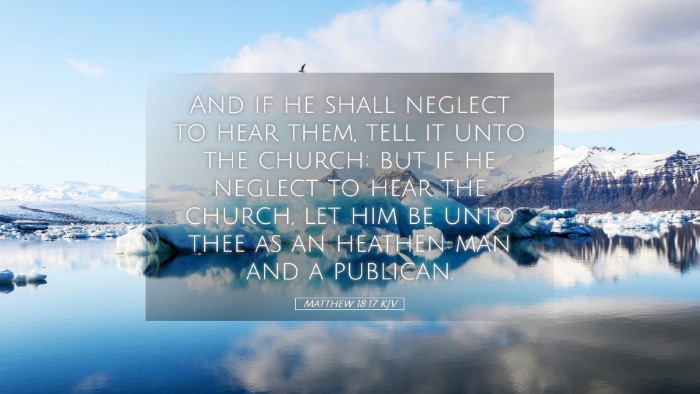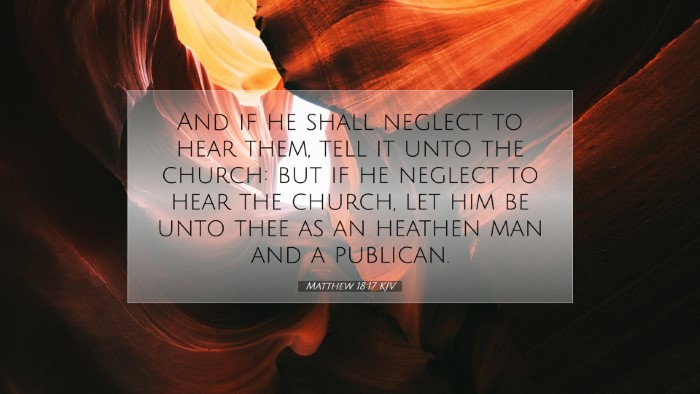Commentary on Matthew 18:17
Verse Context: Matthew 18:17 states, "And if he refuses to hear them, tell it to the church. But if he refuses even to hear the church, let him be to you like a heathen and a tax collector." This verse is part of Jesus' instruction on how to deal with sin within the community of believers.
Introduction
This verse highlights the importance of accountability and communal responsibility in the Christian faith. It addresses the steps of conflict resolution and emphasizes the seriousness of unrepentant sin within the church. Understanding this passage is crucial for pastors, students, and scholars alike, as it outlines a foundational principle for church discipline.
Commentary Insights
Matthew Henry's Commentary
Matthew Henry notes that this verse is part of a broader teaching on the conduct of Christians towards one another, particularly in matters of sin. He emphasizes the need for humility and love in correction, stating that the steps outlined are meant to restore rather than to cast out. Henry observes:
- “The church is a society of sinners, but it is also a society that seeks to reconcile with God through Christ.”
- “The aim of the process prescribed is to restore the offender to fellowship rather than to expel them.”
Henry further asserts that if a person refuses to repent after multiple attempts at reconciliation, the church must take a stand, treating the unrepentant individual as an outsider. He reflects on the metaphor of treating the individual as a "heathen" or "tax collector" as a call for discernment in community relationships.
Albert Barnes' Commentary
Albert Barnes provides a practical perspective, focusing on the procedural aspect of church discipline. He suggests that the passage lays out a systematic approach to address sin, emphasizing the necessity for a clear and defined process:
- “The church must be the final judge in matters of sin among its members.”
- “This procedure is built on the principle of mutual accountability and goal-centric restoration.”
Barnes points out that the refusal to listen at each level—first to the individual, then to a small number of witnesses, and finally to the church—escalates the seriousness of the situation. He elaborates on the implications of being treated as a heathen, noting that this is not merely about exclusion but rather about the seriousness of the covenant community’s integrity.
Adam Clarke's Commentary
Adam Clarke approaches the text with a focus on the relational and communal aspects of church governance. He expresses that the process of reconciliation is essential for both the individual and the community:
- “The purpose of church discipline is corrective rather than punitive.”
- “The community must maintain its purity to nourish mutual faith and growth.”
Clarke elaborates that treating an unrepentant sinner as a heathen or tax collector suggests a clear boundary between the believer and the unrepentant. However, this does not eliminate the possibility of eventual reconciliation; rather, it serves as a protective measure for the body of Christ.
Theological Implications
This verse raises significant theological questions about grace, discipline, and community. Pastors and theologians must grapple with the tension between extending grace and the necessity of maintaining holiness within the church. Allowing unrepentant sin to persist threatens the integrity of the church’s witness to the world.
Grace and Accountability
The balance between grace and accountability is delicate. The steps outlined in Matthew 18:17 are rooted in an understanding of sin's seriousness while still allowing for grace-filled efforts towards restoration. It reflects the heart of Christ, who seeks to heal rather than to harm.
Community Integrity
Maintaining the community's integrity is paramount. As Clarke and Henry noted, the church is meant to be a refuge and a place of growth. Thus, allowing unrepentant sin to fester not only harms the individual but also jeopardizes the spiritual health of the entire congregation.
Conclusion
Matthew 18:17 invites us into a deeper understanding of community, accountability, and grace. The insights from various public domain commentaries underscore the necessity of loving correction and the intricate balance between inclusion and discipline. Pastors and church leaders are called to navigate these waters with both wisdom and compassion, rooted in the teachings of Christ.


